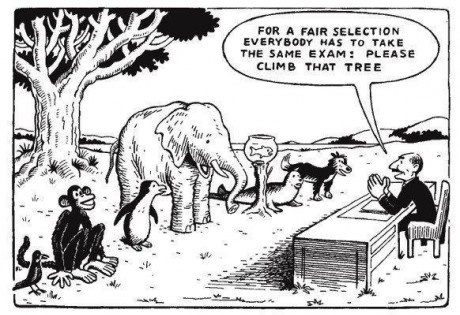“Everybody is a genius. But if you judge a fish by its ability to climb a tree, it will live its whole life believing that it is stupid.” – Albert Einstein
“Great, another quote :/”
If you’re a regular around here, you might have picked up some of my fancy quotes already. This one might be a a bit more complicated than the usual ones so allow me to make it retard-proof;
When we let our life (unconsciously) revolve around the ideas and actions that don’t take into account our individual strengths, interest and talents we’re never going to reach the potential we could have reached if we actually constructed our world around the things we’re actually good at.
Makes sense?
So how do we make sure we do this right?
————————————————–
What are strengths?
“A personal strength is the natural inclination to excel in a particular skill or situation”
Or at least, that’s the best way I can define it.
The key take-away of this definition is that strengths are natural (meaning in-born) qualities in which you perform above-average. They are the things that come easy to us whilst others might have more difficulty in dealing with these.
Why are my strengths important?
Many people (read: almost everyone) don’t know how to leverage their strengths and therefore don’t direct their natural talents and capabilities towards a favorable direction.
It’s the same reason why so many people get stuck in a career that is unfit for their particular skill-set and therefore they get demotivated, depressed and pretty much just “retire on the job”
If you discover and develop your natural inclinations you’re often able to produce much better results (and become more motivated) than if you would go against that.
Additionally, by knowing your weaknesses you’ll be able to steer away from the environments that won’t support you optimally.
“Hey there, wait a minute. My mom always told me that I could be whoever I wanted to be!”
I also believed that statement for a looong time (emphasis on looong)
But here’s the thing;
Strengths are solely a performance indicator (not unchangeable truths). You can still be whoever you want to be, but you won’t perform optimally if you build your life on weaknesses.
“One should waste as little effort as possible on improving areas of low competence. It takes far more energy to improve from incompetence to mediocrity than it takes to improve from first rate performance to excellence” – Peter Drucker
Another note on this came from Strengthsfinder 2.0;
While it may be possible, with a considerable amount of work, to add talent where little exists, our research suggests that this may not be the best use of your time – Strengthsfinder 2.0 by Tom Rath
My recommendation?
- Discover your strengths
- Improve your strengths
- Improve your weaknesses to the degree that they no longer hold you back (to a certain height)
“Alright, great Simon!”
“Soooo…”
What are my strengths?
There’s many different ways to go about finding your strengths so I’ve listed here several routes you can take in order to find this essential information about yourself.
Tests
A great way to start is doing some personality tests;
During the tests you’ll have to judge certain statements and move the slider according to your preferences.
Once you’ve finished the tests, you’ll be redirected toward an overview page where you’ll find all sorts of info about your “personality-type”.
I know this kind off sounds like a horoscope or other pseudo-scientific crap but IMO it has some great insights. To me it “revealed” some accurate facts about myself.
Keep in mind they’re only indicators, not facts.
Books
Another way to discover your strengths if by reading the book; “Managing oneself” by Peter Drucker. I personally don’t believe you need the whole book (which is short, nevertheless) but you can get all the necessary information by simply reading and analyzing the summary.
> Download The Summary <
The book goes into detail to discover different attributes that contribute to your strengths. It’ll help you answer questions like;
- How do I perform best? By reading or listening?
- How do I learn best? (See Learning Styles)
- Do I prefer to work in team or alone?
- Am I a decision maker or an adviser?
- Am I a stress-performer or do I need a structured environment?
Another book I’d recommend on this topic is the strengths-test in the book “Strengthsfinder 2.0” by Tom Rath. It gives a clear overview of your top 5 personal strengths and action points which you can use to leverage these to their best potential.
Environment
Most often we’re blind to certain strengths and weaknesses whilst our surroundings are much faster at picking these up.
So simply ask around!
Ask your friends and family what they think could be your weaknesses and strengths and see if they say similar things (or give some totally new insights)
Often these are the traits that people appreciate you for, look up to you for, need your help for, …
Energize
Supersaiyan
Another great indicator of personal strength is to pay close attention to the activities that “energize” you. We often (if not always) excel at natural strengths and therefore we’re more inclined to spent time in these areas since they feel so rewarding.
Ask yourself?
- When was the last time you felt excited by a particular task that most people don’t find interesting?
- What are the activities you can lose yourself in? Mihaly Csikszentmihalyi (Yes, I copy-pasted his name) calls this “the flow-state”. When we are in “flow”, time passes quickly and we feel absorbed in the task at hand.
- What topics do you LOVE to talk about with others and discus intensely?
- What blogs, videos or books are you primarily interested in?
Childhood
Another indicator of strength is to look back at your youth to see what captivated your attention in those early periods of your life. Over the years we’ve become conditioned to move away from the things we love the most because our surroundings have told us that “there’s no money to be made there”, “it’s a waste of time” whilst, in childhood, we’re the deepest connected to our strengths.
Another reason why we’re disconnected from our natural inclinations is because standard education forces each child trough the same curriculum without taking into account personal strengths and weaknesses (learning style, method of performing, …)
Anyway, I’ve already talked about that topic in my article on “Should You Go To School?”
What to do?
Ask your parents/older brother or sister what you used to do all the time when you were younger. Explore the attic where your old toys and drawings are stored.
More Questions
- In what did you grew up around? Competence can arise from early practice, what types of activities were you involved in as a child?
- What do strangers compliment you on? You/your direct surroundings often don’t notice your natural strengths as much as others do.
- What did you want to become as a child? What were the underlying trends?
- What have you been doing the last 10 years? Competence can arise from doing a certain thing over and over.
- What can you effortlessly talk about without losing drive? An interesting topic is most likely something you’re highly skilled at.
- What are the things you effortlessly excel at? What comes easy for you?
- In what areas do you learning quickly? Some skills are perfectly suited to our temperament and therefore we’re able to pick these up much faster and accelerate our expertise.
- Who do you envy? Jealousy is a nasty but beautiful emotion as it shows us what we truly want.
Essence
The key-thing I want you to take away from this is to build your life on strengths and not let weaknesses hold you back.
It will probably take a while to get to a definite decision as to what your strengths and weaknesses might be, but don’t let these hold you back. Keep searching
I recommend to keep a list of all your personal strengths in a word file or in Onenote. This knowledge will help you tremendously in choosing your direction in life and achieving some form of success.
Reminder: Strengths are performance indicators (not truth). You’re not limited to what you’re able to do, you’ll just perform optimally if you perform from strengths.
“Self-reverence, self-knowledge, self-control; these three alone lead one to sovereign power.” – Alfred Lord Tennyson
Anyway, that leads me into my final question (which you should ask yourself when choosing a career direction)
Given my strengths, interests and values, how can I provide value for others?
—————————————————————
If you feel like this post can help anyone out that you know, feel free to share it with your friends or send it in a mail to your mom! It helps me out a lot! If you’re having any thoughts or questions on this topic, feel free to share those with me in the comment section below.
Take care,
Love,
Simon


